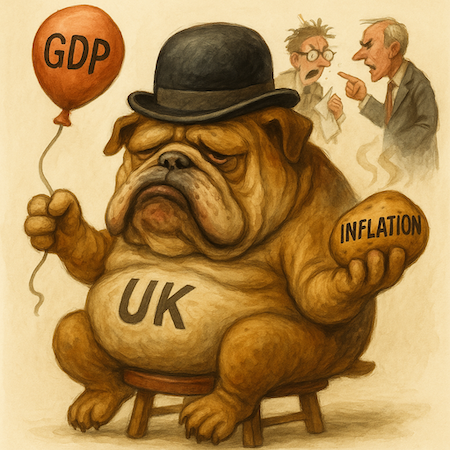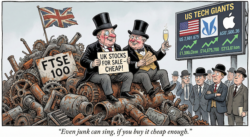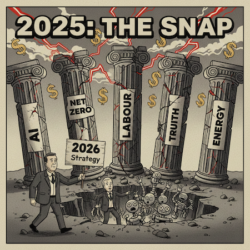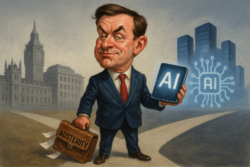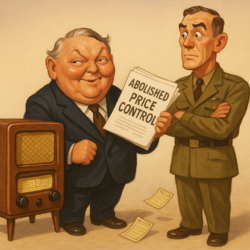- Labour delivers its economic legacy, again
- Statistics fit for little more than political football
- Time to run for the exits before someone shouts “fire”
They might not deserve it. But you’ve got to feel sorry for economists. They spend their entire career learning and preaching things that constantly get disproven. How humiliating it must be.
And yet, they never seem to learn.
The UK is stuck in stagflation yet again. 0% GDP growth in July. Unemployment surged to 4.7% – a jump that usually precedes a recession. Wage growth fell to the lowest pace in three years. Inflation ticked up to 3.8% – the highest in 18 months. Food and drink prices were up 5.1%.
With inflation almost double the target, the Bank of England decided to marginally loosen monetary policy! It’ll reduce how fast it sells government bonds back into the market.
The government is doing its best to prove that its economists have no clue either. Chancellor Rachel Reeves reckons inflation is higher in the UK than elsewhere because of international factors…
You’ve got to be joking.
In his reply to her letter, Bank of England Governor Andrew Bailey reckons the inflation is the government’s fault.
He explained that inflation was boosted by “the increase in employer National Insurance Contributions (NICs) and pay growth in sectors with a large share of employees at or close to the National Living Wage (NLW).”
Another BoE report warned net zero packaging taxes will push food prices higher. Then there are energy bills, which are rising despite a low gas price. Awkward.
But it gets worse.
The Office for Budget Responsibility warned that its guestimates for productivity growth may be downgraded too. The Treasury was quick to blame this on the previous government. An official told the Financial Times that, “The untold story of this Budget is the historical legacy of the Conservatives that nobody knew about.”
I had no idea the Conservatives ruled in secret!
Journalists are obsessed by what all this means for politics. The size of Labour’s self-imposed fiscal black hole keeps getting larger with each new estimate.
Admittedly, economic statistics are so unreliable that they’re fit for little more than a political football. The revisions make a mockery out of the debate we have each time new data comes out.
But what does it tell us about your very real future?
Economic policymakers are deluded
High inflation and low economic growth is supposed to be an impossible combination. At least under the economic theories used by the sorts of economists politicians like to hire.
The most blatant example of this delusion comes from Australia. Back in 2021, the central bank there promised not to hike interest rates until wage growth had accelerated. That wouldn’t happen until 2024, they said.
This promise presumed that inflation is everywhere and always and employment phenomenon. A theory known as the Phillips Curve. If more people are earning more, they push up prices.
This is manifestly stupid because more people working more produces more too. And prices are not just a function of supply and demand, but of the amount of money in the economy. Something the central bank of Australia was busy increasing extremely rapidly at the time.
You can imagine what happened next. Wages remained flat, inflation went bonkers and the central bank raised interest rates in 2022, which was far too late. Mortgage borrowers were absolutely apoplectic over the broken promise.
The UK’s government is suffering from a similar delusion. It presumes that if inflation is high while the economy is comatose, then it must be evil foreign influences that are responsible for the price hikes…
The truth is very simple. Inflation is everywhere and always a question of how you define it. And these days, anything goes.
It could be a measure of rising prices. But which prices do you include? And how do you adjust for things like technology and quality?
Inflation could be a measure of the money supply. But that has rather a lot of definitions too, ever since debt and money became indistinguishable.
The best definition for investors is the rate of return you need to generate to get ahead. You might even want to include your marginal tax rate in that definition. Especially because the Treasury doesn’t give you a tax credit for capital gain their inflation caused.
The point about stagflation is that the investor’s bar becomes higher and more difficult to clear at the same time.
Stagflation is a dangerous game for investors to play
A stagnant corporate sector combined with rising prices means investors get squeezed on both counts. They need to deliver higher returns with less opportunities.
My question for you is simple. Why put up with it?
Fund managers have cottoned on. City AM reports the exodus is both well underway and accelerating:
Average equity allocations to the UK dropped from a net 2 per cent underweight in August to a net 20 per cent underweight in September, according to Bank of America’s global fund manager survey, marking the biggest monthly rotation away from UK equities since 2004, and the second biggest allocation drop on record.
A 20% underweight allocation is astonishing in its own right. It means fund managers hold 20% less UK stocks than a balanced portfolio would imply.
It’s time to get more of your own money out of the UK. Invest it where it’ll be put to productive use, in a low inflationary environment with sensible tax policy. Here.
Until next time,

Nick Hubble
Editor at Large
P.S. If stagflation has taught us anything, it’s that traditional thinking won’t help you get ahead. The UK is stuck. Investors are fleeing. But that doesn’t mean you need to suffer with it. While the headlines scream “recession,” a new Wealth Window could be opening — and Britain might be first in line to profit. Most people won’t see it coming. But you still can. Here’s how.
